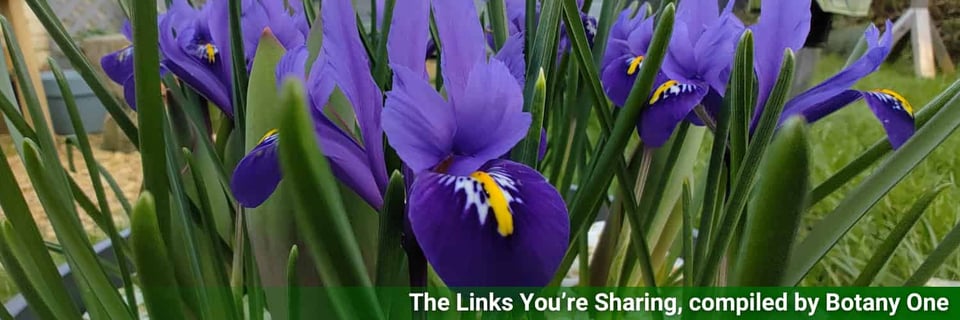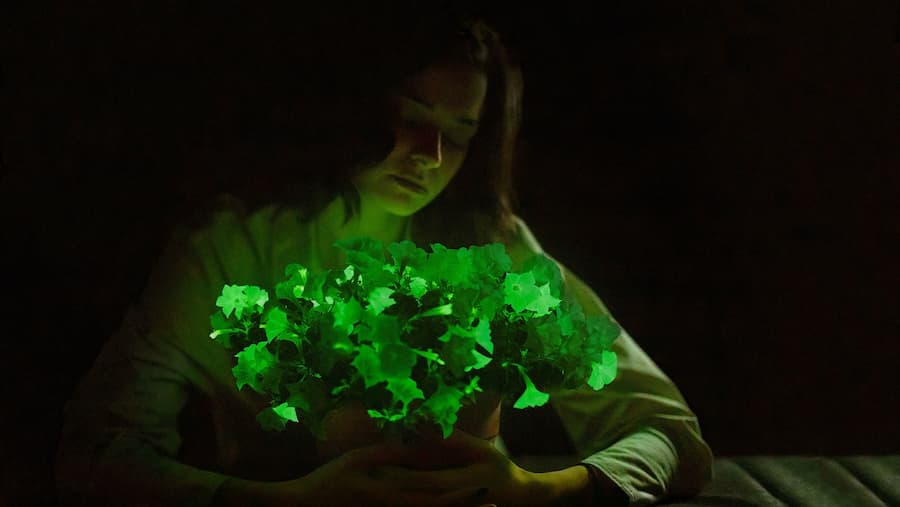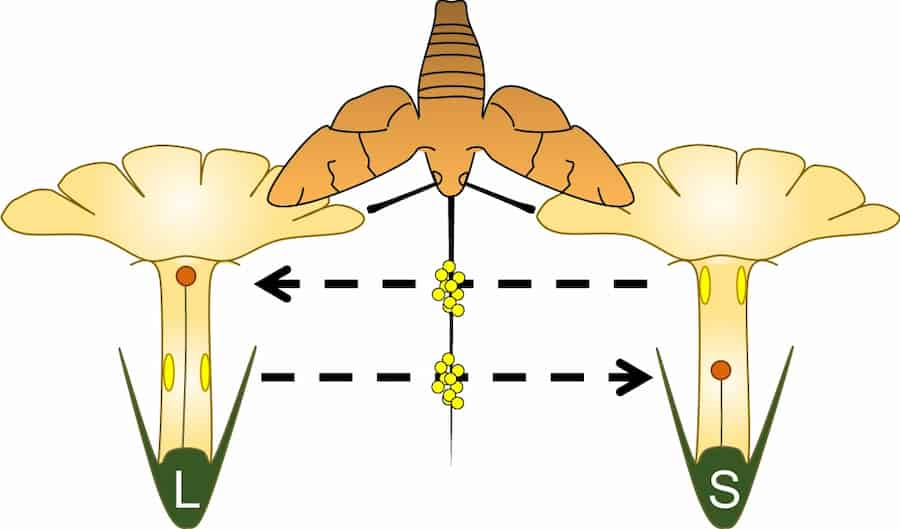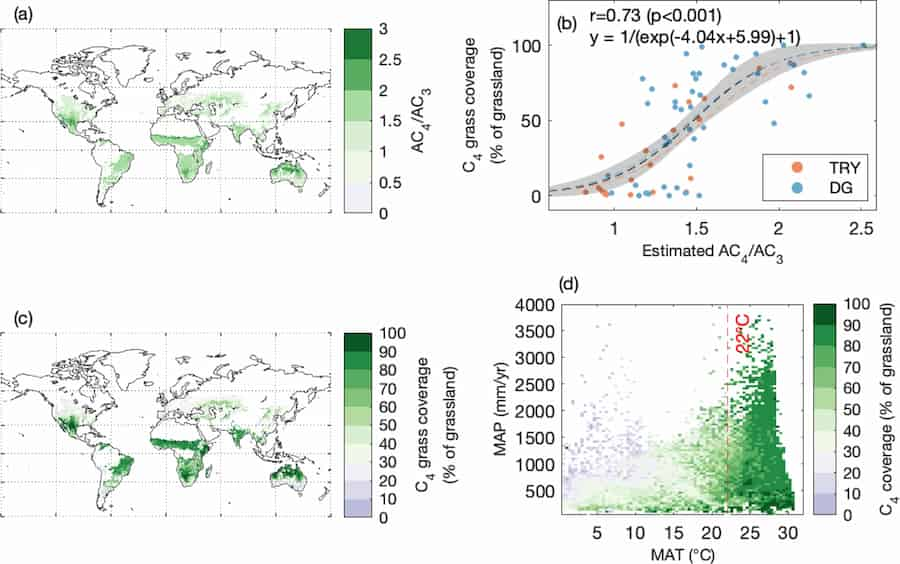🌻 The Week in Botany, February 19 2024

I'll start by flagging up the Plant Health Undergraduate Studentships in the Careers section. The RSB has twelve awards for undergraduates to get some experience this summer in plant health, but the deadline is coming up soon. It's on the 4th of March.
I also have a deadline this week. I'm away at the weekend, if all goes to plan. So I'll be aiming to have most of the next week's email written by Thursday. I'll probably add a few more items a little later on Friday, but if there's anything you want mentioning, get it in early. The email will be scheduled for to arrive the usual time on Monday morning. Until then, take care.
Alun (webmaster@botany.one)
In AoBC Journals This Week
Phylogenomics and plastomics offer new evolutionary perspectives on Kalanchoideae (Crassulaceae) ($)
Orchid seeds are not always short-lived in a conventional seed bank! ($)
A mathematical model of photoinhibition: exploring the impact of quenching processes (OA)
News & Views
Pesticides to help protect seeds can adversely affect earthworms' health
While pesticides protect crops from hungry animals, pesky insects, or even microbial infections, they also impact other vital organisms, including bees and earthworms. Exposure to nonlethal amounts of these insecticides and fungicides resulted in poor weight gain and mitochondrial DNA (mtDNA) damage in the worms.
These Glow-in-the-Dark Flowers Will Make Your Garden Look Like Avatar

The sci-fi dream that gardens and parks would one day glow like Pandora, the alien moon in Avatar, is decades old. Early attempts to splice genes into plants to make them glow date back to the 1980s, but experiments emitted little light and required special food.
The Root & Shoot RCN has its February Newsletter out, with news about inclusivity in botanical careers.
After Shutting Down, These Golf Courses Went Wild
Most defunct golf courses get paved over, but a number are getting transformed into ecological life rafts for wildlife, plants — and people.
Scientists Decry Closure of Duke’s Herbarium
Duke University is closing its herbarium, which is among the largest herbaria in the country, housing more than 825,000 plant species. There is a petition against the decision.
See also: ‘A tragic mistake’: Decision to close Duke University’s herbarium triggers furor
Root microbes may be the secret to a better tasting cup of tea
You'd think the complex flavor in a quality cup of tea would depend mainly on the tea varieties used to make it. But a study appearing in the journal Current Biology shows that the making of a delicious cup of tea depends on another key ingredient: the collection of microbes found on tea roots. By altering that assemblage, the authors showed that they could make good-quality tea even better.
When planting trees is bad for the planet
An area of ecologically intact and biodiverse grassland larger than France is endangered by an NGO-fueled push to plant as many trees as possible.
A Big Tech-backed campaign to plant trees might have taken a wrong turn
A new analysis scrutinizes a popular forest restoration initiative backed by the Bezos Earth Fund and Meta.
You’ve tried plant-based meat, but here come meat-based plants
South Korean researchers infused actual rice grains with cow muscle and fat cells.
Car Fumes, Weeds Pose Double Whammy For Fire-Loving Native Plants
Springtime brings native wildflowers to bloom in the Santa Monica Mountains, northwest of Los Angeles. These beauties provide food for insects, maintain healthy soil and filter water seeping into the ground — in addition to offering breathtaking displays of color. But new research shows wildflowers that usually would burst back after a blaze and a good rain are losing out to the long-standing, double threat of city smog and nonnative weeds.
Scientists aghast at bizarre AI rat with huge genitals in peer-reviewed article
It's unclear how such egregiously bad images made it through peer-review.
Scientific Papers
Plants distinguish different photoperiods to independently control seasonal flowering and growth ($)
Plants are highly responsive to photoperiodic cues, and in many parts of the world, daylength varies considerably throughout the year. Complex signaling networks have been identified that regulate the timing of flowering in response to daylength. Wang et al. found that a parallel mechanism exists to regulate vegetative growth.
Olfaction in the Anthropocene: NO3 negatively affects floral scent and nocturnal pollination ($)
Chemical pollutants not only reduce animal survival and reproduction, but can also disrupt their senses, changing their behavior and interactions with other species. Common air pollutants such as ozone degrade floral scents, potentially affecting insects’ ability to locate and pollinate flowers. Chan et al. tested the effects of ozone and nitrate radicals (NO3) on nocturnal hawkmoth pollination of a desert plant.
Crop traits and production under drought ($)
Vadez et al. discuss the influence of moderate drought on crop productivity and the role of physiological traits in drought tolerance and adaptation.
ReadCube: https://rdcu.be/dyPvk

Simón-Porcar et al. update the number of heterostylous and other style-length polymorphic taxa to 247 genera belonging to 34 families, notably expanding known cases by 20%. Using phylogenetic and comparative analyses across the angiosperms, they show numerous independent origins of style-length polymorphism associated with actinomorphic, tubular flowers with a low number of sex organs, stamens fused to the corolla, and pollination by long-tongued insects.
A slow-fast trait continuum at the whole community level in relation to land-use intensification (OA)
Organismal functional strategies form a continuum from slow- to fast-growing organisms, in response to common drivers such as resource availability and disturbance. However, whether there is synchronisation of these strategies at the entire community level is unclear. Neyret et al. combine trait data for >2800 above- and belowground taxa from 14 trophic guilds spanning a disturbance and resource availability gradient in German grasslands.
Mapping the global distribution of C4 vegetation using observations and optimality theory (OA

Luo et al. used global observations of plant photosynthetic pathways, satellite remote sensing, and photosynthetic optimality theory to produce an observation-constrained global map of C4 vegetation. Global C4 vegetation coverage decreased from 17.7% to 17.1% of the land surface during 2001 to 2019. This was the net result of a reduction in C4 natural grass cover due to elevated CO2 favoring C3-type photosynthesis, and an increase in C4 crop cover, mainly from corn (maize) expansion.
Dot scanner: open-source software for quantitative live-cell imaging in planta (OA)
Confocal microscopy has greatly aided our understanding of the major cellular processes and trafficking pathways responsible for plant growth and development. However, a drawback of these studies is that they often rely on the manual analysis of a vast number of images, which is time-consuming, error-prone, and subject to bias. To overcome these limitations, Allen et al. developed Dot Scanner, a Python program for analyzing the densities, lifetimes, and displacements of fluorescently tagged particles in an unbiased, automated, and efficient manner.
Thonningia alba (Balanophoraceae), a new root holoparasitic species from Madagascar ($)
A new species of Thonningia is described. T. alba is the third species to be recognised in the genus, and the fourth in the family Balanophoraceae from Madagascar.
ReadCube: https://rdcu.be/dyPw8
Belowground foundations of tropical forest restoration ($)
There is great global interest in tropical forest restoration, but many restoration efforts are not effective. McCulloch et al. argue for the importance of belowground processes in tropical forest restoration and provide suggestions of next steps to advance our understanding of belowground processes in tropical forest restoration success.
Agroecological genetics of biomass allocation in wheat uncovers genotype interactions with canopy shade and plant size (OA)
Golan et al. studied recombinant lines of wheat (Triticum spp.) grown as single plants under sunlight and simulated canopy shade to investigate genotype-by-environment interactions in biomass allocation to the leaves, stems, spikes, and grains.
Careers
Plant Health Undergraduate Studentships, UK
The Royal Society of Biology invites applications from researchers wishing to host undergraduate studentships in plant health over the summer of 2024. Twelve awards are available. Funding for the programme is provided by Defra, BSPP, AAB, SCI Horticulture Group and The Colegrave Seabrook Foundation (in partnership with the Crispa (Richard Cahn) Charitable Trust). Full details are available at: www.rsb.org.uk/plant-studentships
Technical Officer Hybrids Crops, Sydney
The Faculty of Science is currently seeking a Technical Officer to provide technical support in the laboratory, greenhouse and field. They support the operations of the hybrid crops research program, undertake experiments, and collect qualitative and quantitative data. They are also responsible for ensuring work, health and safety standards are observed in their work area.
Bioinformatician/Computational Biologist, Brno
The Central European Institute of Technology (CEITEC), Masaryk University, CZ, is announcing the opening of a postdoctoral position for a Bioinformatician / Computational biologist. We are seeking a highly skilled bioinformatician / computational biologist with substantial expertise in plant genomics to contribute to a research project focusing on the in-depth analysis of genome structure and evolution in the genus Boechera (Brassicaceae). This role is essential for the three-year research project led by Dr. Terezie Mandakova and funded by the Czech Science Foundation.
Lecturer / Senior Lecturer / Associate Professor in Genomics, Melbourne
The School of BioSciences at the University of Melbourne is seeking two enthusiastic and collaborative academic colleagues with expertise in genomics. One appointment will focus on computational and/or computational synthetic genomics, while the other will specialise in functional or synthetic genomics (wet-lab-based research). Applicants interested in plant, insect, and microbial systems or using established model systems from these taxonomic groups are particularly encouraged to apply.
Post-Doctoral Associate in the Center for Genomics and Systems Biology, Dr. Aashish Jha, Abu Dhabi
The Center for Genomics and Systems Biology (CGSB) at New York University Abu Dhabi (NYUAD) is seeking a motivated recent PhD graduate with excellent hands-on research in genomics or bioinformatics demonstrated by publications to join the Evolution of Pathogen Resistance in Plants research team and to work on host-parasite interactions in plants using diverse high-throughput datasets (WGS, WMS, metabolomics, and sc-RNA seq). This study aims to decipher the factors that enable the long-term maintenance of plant resistance to disease in natural systems. The ultimate goal is to apply these insights in a broader agricultural context.
Research Laboratory Technician (Fixed Term), Cambridge
The Department of Plant Sciences is seeking to appoint a Research Laboratory Technician to provide technical support for teaching and research activity in order to ensure the smooth running of a laboratory or research facility. In particular, this role will be responsible for analysing large phenotyping datasets to estimate best linear unbiased predictors and perform genome wide association and QTL mapping studies to identify genetic determinants for phenotypic traits.
Tenure Track Assistant Professor STEM Education, Groningen
We have an opening for an Assistant Professor to strengthen our position in the field of Science, Technology, Engineering, and Mathematics (STEM) higher education. STEM education is primarily concerned with the theories, tools, methods, and approaches that facilitate the practice of STEM or the study of STEM through an interdisciplinary approach. As such, the field engages with questions related to STEM literacy, STEM thinking, problem-solving, critical thinking, teaching and learning, as well as connections between the STEM disciplines.
7 Postdoc Positions Kiel Training for Excellence, Kiel
KiTE – Kiel Training for Excellence funded within the COFUND-Programme of the Marie Skłodowska-Curie Actions (MSCA) is a career development programme for excellent postdoctoral researchers from all over the world offering funding for up to 7 Postdoc Positions at Kiel University, Germany.
Postdoctoral Research Associate, Oxford
We used artificial intelligence to predict novel protein-protein interactions at the plant-pathogen interface and discovered five unrelated inhibitors produced by four different tomato pathogens that all target the P69B immune protease of tomato (Homma et al., Nat. Comm. 2023). This project aims to elucidate the arms-races between these inhibitors and P69B-like immune proteases and use this knowledge to engineer extracellular immunity. You will first resolve the inhibition mechanisms and determine the specificities of interactions with P69B paralogs and homologs, also from non-host plants.
Research Associate (Fixed Term), Cambridge
The Department of Plant Sciences is seeking to appoint a post-doctoral Research Associate to contribute to the development of disease-resistant crops. The successful candidate will join the Patron Lab to work on a collaborative project with the Morris Lab (John Innes Centre), and the Denby Lab (University of York). This multidisciplinary team will combine their expertise in systems biology, modelling, and synthetic biology to engineer resistance to broad host-range fungal pathogens in lettuce. More information about the lab is available at patronlab.org.